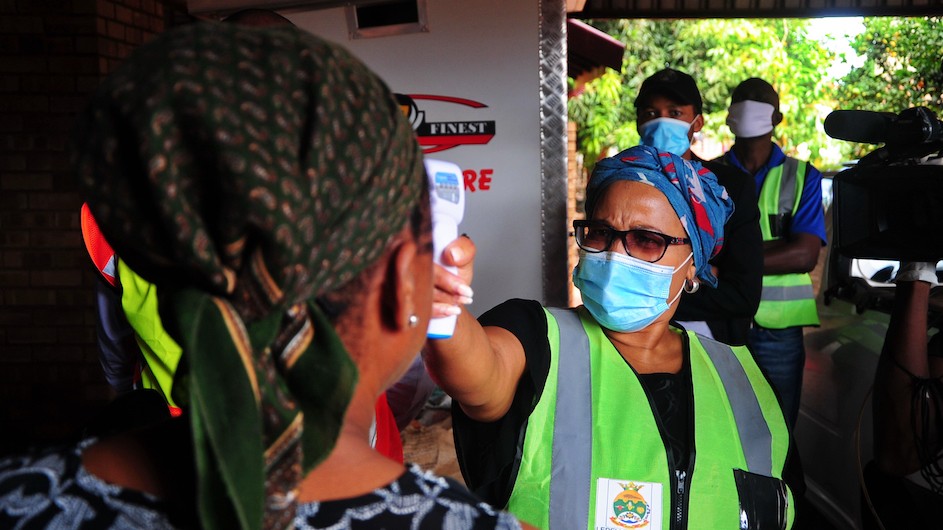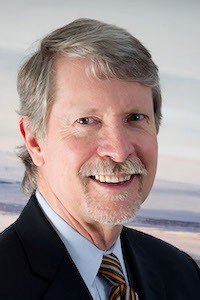How Data Collection Can Boost the Pandemic Response in Africa
To control the COVID-19 pandemic, a majority of the world needs to be vaccinated. A group of researchers from Columbia University is working with local governments in African countries to help their communities get the vaccines they need.

Taking Action is a Columbia News series that seeks to showcase efforts from around the university that rely on academic knowledge to tackle real-world challenges in a purposeful way.
The COVID-19 vaccines have proved to be remarkably effective and safe. People in countries, like the United Kingdom, United States, and Israel, where vaccines are plentiful, data collection is robust, and distribution systems are in place, are happily resuming their lives, after a long year of isolation, death, and despair. However, in many regions, COVID vaccines are extremely scarce and vaccination rates are low. Without high rates of vaccination around the world, COVID will continue to spread, people will die, and the virus will mutate. Worldwide vaccinations are essential to end this pandemic, but how will this be accomplished?
An interdisciplinary team of physicians, researchers, and academics from Columbia University and the University of Witwatersrand in South Africa aims to solve this urgent problem by building data collection and analysis systems in partnership with governments and local communities throughout Africa.
Taking Action
Dr. Wilmot James, senior research scholar at the Institute for Social and Economic Research and Policy (ISERP), and Dr. Lawrence Stanberry, associate dean for international programs at Columbia University Vagelos College of Physicians and Surgeons, are leading the Schmidt Futures funded project, VacSafe. Columbia News caught up with them to find out how data collection is key to an effective pandemic response, why it is vital that we think globally about vaccinations, and how this project can help the world be better prepared for the next global health crisis.
Q: Could you briefly describe VacSafe and what you have found so far in your research.

James: The purpose of VacSafe is to catalyze project innovations in vaccine safety data collection, reporting and use for clinical, public health, vaccine adjustment, and risk communication purposes. VacSafe emerged from a Schmidt Futures funded research project on pandemic response in Egypt, Ethiopia, Kenya, Nigeria, and South Africa that is still ongoing. We presented our interim findings to the Futures Forum in early January 2021, and Schmidt Futures decided to support setting up VacSafe at the Center for Pandemic Research Center at ISERP in partnership with the Program in Vaccine Education at the Vagelos College of Physicians and Surgeons with Dr. Stanberry. Our team at Columbia is also partnering with Dr. Shabir Madhi and Clare Cutland at the University of the Witwatersrand in Johannesburg.
Stanberry: The one thing that we’ve observed across all five nations is that there's a paucity of data. There are simply limited systems available to help policy makers make informed decisions. One example is that of being able to measure excess deaths. This is a metric that's used in many high-income countries to be able to estimate how many deaths may have been due to COVID this past year. Such systems do not exist in most low- and middle-income countries.

Our working group is charged with coming up with ideas for projects that could result in creating the infrastructure to collect the needed data. Once we have the data, we’re going to determine how best to message and disseminate the data to help build vaccine confidence with the general public.
Q: Why is this project important, particularly in Africa?
Stanberry: Quite frankly, it's important because vaccine hesitancy exists everywhere. The specific drivers of hesitancy or resistance varies enormously. You can't look at what works to build confidence in New York City and think that it's going to work in Cape Town. It’s our belief that if a country has robust data that's regional, not international, about who's being immunized and how safe the vaccines are within regional communities, people are more likely to be accepting of the vaccines.
We also recognize that we're not going to have control of this pandemic until we get the entire world immunized. Just having the United States fully immunized doesn't protect us against the development of variants that occur in populations where the infection rates are out of control. If you have lots of places with very small numbers of people immunized and a high rate of COVID circulating, you'll likely see new variants, which theoretically could be resistant to the vaccines.
James: What I have learned from Larry is that the less you vaccinate, the more opportunities there are for variants to emerge, and the greatest risk area for that is Africa, South America, and Southeast and South Asia. That is extremely scary because how you manage the pandemic becomes even more challenging under circumstances where the resources, skills, and infrastructure for doing so is far less developed than in the North.
Q: Could you describe your backgrounds, your teams, and how you're going to bring your academic knowledge to this project?
Stanberry: I'm trained in infectious diseases, specifically in virology. I've spent more than 30 years focused on vaccine development with a particular interest in vaccines for biodefense and emerging and neglected diseases. Wilmot is the person interested in vaccination, and I'm the guy focused primarily in the development of vaccines, so we make an interesting partnership.
James: I have a PhD in sociology from the University of Wisconsin and African history is my minor. I have a keen interest in why human beings do what they do, even though it seems, irrational at times. Why do some people accept vaccines and why do others not?
As for our team, we have a number of social science-trained people. Some of them understand the business of making vaccines, some of them deal with the technology, some of them study health security and vaccine social questions like I do, but the majority of the group are vaccine experts and public health experts, and most of the members of the group actually are physicians, which is critical.
Stanberry: Since we're focused on the continent of Africa, there's a very large representation of scientists and scholars who are African. It's a marvelous collaboration.
Q: How are you going to involve local communities and government entities in your project?
James: Let me just start by saying that vaccine safety programs without exception are run by governments using public sector entities to lead public health collaborations. In setting up our pilot projects, we must collaborate with willing governments. We are presently identifying two pilot proof of concept sites in Sub-Sahara Africa.
Stanberry: We have to engage communities because different communities may have unique concerns about vaccines. It comes down to what you do around risk communication because it can't be one message fits all. You've got to understand the community, and you've got to tap into those influencers within the community that can encourage the people that they connect to to be immunized. At the end of the day, it all comes down to engaging the community.
Q: Do you envision that the communities and the local governments that you are partnering with will be able to continue the work once you’ve left?
James: It’s important to emphasize that we are a catalytic operation. We want to stimulate the creation of projects by providing skills, expertise, momentum, and some funds. In the end, projects like these must be taken up by governments. They must be financed by governments to become sustainable, as an investment in preparedness for when the next epidemic outbreak comes around, which it no doubt will.
We have to be confident that the governments with whom we partner have a commitment, usually indicated when they put projects like these into their annual budgets.
Q: What are your long term goals for this project?
James: We envision that the work that we are doing now will not stop with COVID-19. What we'd like to do is monitor the safety of all new vaccines introduced on the African continent. That means that we have a much longer life beyond the duration of this pandemic.
Stanberry: We hope that this will have some impact on the ongoing pandemic, but the vision that Wilmot articulated is that we're going to have more problems in the future. The work that we're doing over the next few years hopefully will allow us to respond better when the next pandemic comes along, and it will.
Q: Any final thoughts?
James: I love this project because it thrives on collaboration. It’s collaborative across disciplines, across continents, and across segments of the global apparatus involved in pandemic response. It brings joy to my heart. I'm from the African continent too, so it's important personally that we try to upgrade systems there and to get my country South Africa to play a significant role. We bring people with expertise from Columbia, together with experts in South Africa, Kenya, Nigeria, Egypt, and other countries, it's a true collaboration. And collaboration is what we need to deal with this and the next pandemic.